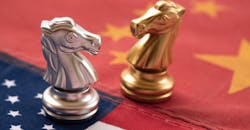NAM to Biden: China Policy Needs a Reset
The National Association of Manufacturers sent the following letter to President Joe Biden on March 17:
As the United States emerges from the health crisis and economic devastation of the COVID-19 pandemic, manufacturers believe we have an obligation to help shape the new, postpandemic world and assert strong U.S. global leadership, working with allies and partners to rebuild the economy and tackle our shared global challenges. One of the biggest factors in these efforts is the rise of China, its increasing global ambition and the size and reach of its economy.
Manufacturers urge your administration to rapidly develop, publicly release and robustly implement a formal national China strategy suited for a new, post-pandemic world. This new doctrine should boost national security, promote American democracy and values abroad and strengthen our ability to compete economically with China. This strategy should be based on robust consultation with stakeholders, including the full array of U.S. government agencies, bipartisan voices on Capitol Hill and experts from business and other relevant communities. We encourage you to announce that final strategy publicly and simultaneously ensure quick executive and legislative action to implement it, clearly signaling to China and our allies our strong commitment on these issues.
As you and your administration have rightfully signaled, we need a new approach to China—strong and strategic, rooted in American strengths and values and coordinated with our allies. And the time is now: China is not sitting still, signing new trade and investment agreements with key allies in Europe and Asia just in the past few months.
America’s strategy must reflect the realities of the moment and the future: as we take stock of new post-pandemic realities, China will be a necessary partner, a fierce economic competitor and a major rival challenging American global influence. For manufacturers, China has long been a hub for unfair industrial subsidies and government-fueled overcapacity in areas like steel and aluminum that distort global markets. China continues to promote discriminatory industrial policies, forced technology transfer and intellectual property theft that harm manufacturers and workers in the United States. Increasingly, China is also using global institutions and its economic influence to build alliances that challenge American interests, human rights and democratic values.
Yet China will also be a key player in tackling global challenges that matter for manufacturers, from COVID-19 to climate change. And China is a major destination for U.S. exports, with nearly $90 billion in manufactured goods going there in 2020, placing it behind only Canada and Mexico in the ranks of our biggest trade partners and supporting hundreds of thousands of well-paying U.S. manufacturing jobs.
The new strategy must include all available tools, including targeted bilateral engagement, assertive U.S. leadership in global institutions and close, coordinated engagement with allies and partners. Strategic use of legislative and enforcement tools will be critical to pressure China to change its economic behavior and to level the playing field for manufacturers and workers in the United States. As such, this strategy must include:
• Investments that benefit manufacturers and American workers through inclusive policies that strengthen domestic supply chains, invest in the U.S. manufacturing workforce, improve our infrastructure, promote innovation and ensure smart regulation
• Assertive global leadership to ensure that the United States—not China—is writing the rules for the post-pandemic global economy and trading system to benefit manufacturers and workers in America, with the United States leading efforts to modernize the World Trade Organization and join the Comprehensive and Progressive Agreement for TransPacific Partnership
• Clear, consistent pressure—directly and with allies—for China to fully meet trade and economic commitments it has made to the United States, including those made during its WTO accession process, the 2020 U.S.–China “phase one” trade deal and high-level commitments in previous bilateral dialogues;
• Strategic use of domestic and multilateral trade enforcement tools that can effectively address problematic Chinese trade behavior in a targeted manner, coupled with a rapid review of trade enforcement tools whose broad use has caused direct harm and significant uncertainty to manufacturers and workers in the United States
• Strategically timed resumption of negotiations toward a robust, comprehensive and fully enforceable trade agreement with China that addresses the wide range of outstanding trade barriers and problematic Chinese behaviors
• Active negotiations with trusted trading partners, particularly those in the Americas and Asia-Pacific, on innovative supply chain–focused agreements and programs to promote supply chain diversification and security, strengthen supply chain ties and address human rights and labor concerns
• Upgrades to national security regulatory frameworks, such as investment security reviews and export controls, through carefully crafted, targeted approaches directly and with allies that strengthen national security
• A renewed commitment to promoting American values and human rights abroad, including stronger collaboration between U.S. government agencies and manufacturers to strengthen and address issues such as forced labor.
A comprehensive China doctrine that addresses these elements will level the playing field for manufacturers and their employees in the United States. It will give your administration room to address the tensions and uncertainty in the U.S.–China relationship and achieve real policy wins. Such positive outcomes will also provide critical room for your administration to mitigate broad-brush tools that harmed manufacturers and workers and elevated tensions and uncertainty without addressing the underlying problems in the U.S.–China relationship.
Mr. President, manufacturing workers and businesses across America share your commitment to building a stronger, fairer, more inclusive country that leads global efforts to create a better world and fights to ensure that all Americans share in its benefits. As you stated last month, “If we invest in ourselves and our people, if we fight to ensure that American businesses are positioned to compete and win on the global stage, if the rules of international trade aren’t stacked against us, if our workers and intellectual property are protected, then there’s no country on Earth—not China or any other country on Earth—that can match us.”
